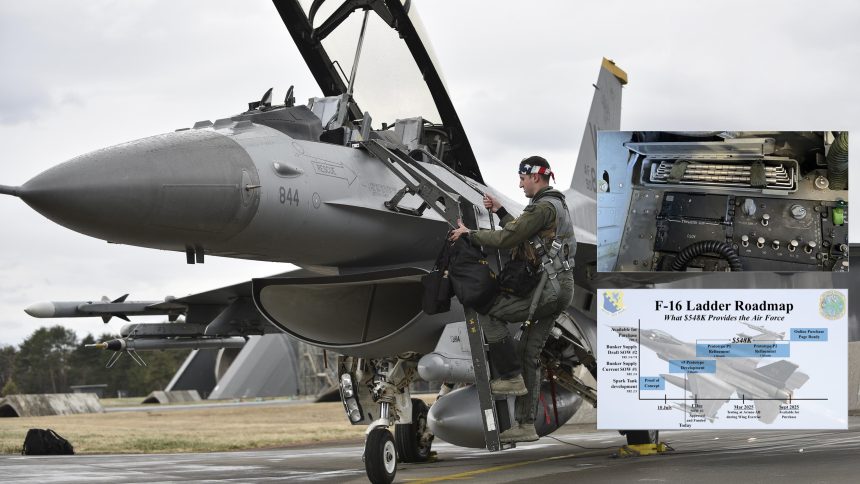F-16 pilot developed a cockpit stowable collapsible ladder to aid Agile Combat Employment operations.
At a time when the U.S. Air Force is heavily pressing forward with ACE (Agile Combat Employment) concepts for distributed operations, the absence of a built-in ladder in the F-16 for the pilot to climb in and out of has been wanting.
A prototype ‘Cockpit Collapsible ACE Ladder’, that easily fits in the map case inside the cockpit, developed by the 31st Fighter Wing’s F-16 pilot, Maj. Nicholas “Trapper” Atkins at Italy’s Aviano Air Base to address this problem, has emerged as the winner of the Spark Tank 2024, and is now seeking funding. USAFE (U.S. Air Forces in Europe) said the prototype a collapsible ladder can be stored inside an F-16’s “unused map case, allowing commanders the flexibility to dynamically deploy and redeploy the jets to or from austere locations.”
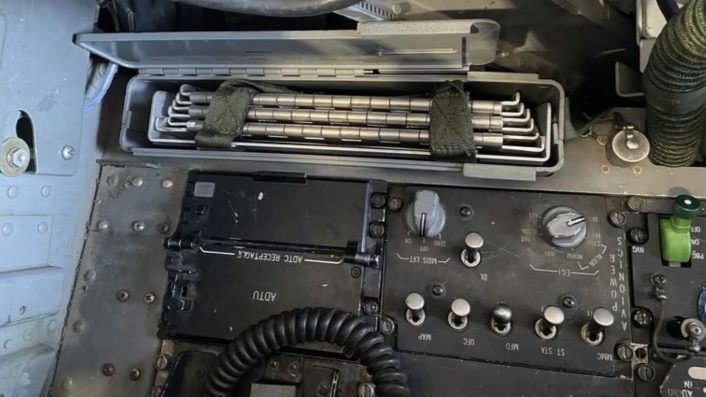
The built-in boarding ladders extends out of panels under the cockpit on the side of the aircraft. This feature is available on the F-35A Lightning IIs, F-15s and the A-10 Warthogs. Under the DAF’s (Department of the Air Force) 2024, Spark Tank invites innovators from across the service to present ideas to a panel of industry and Air Force leaders.
Shout out to the Aviano Air Base gang for building a collapsible ladder for the F-16 that can fit inside the map case in the cockpit. Outstanding! #f16 #f16viper #avianoairbase #usaf #aviationsafari #aviationpreservation #boneyardsafari pic.twitter.com/ZnsiIy2lxs
— Boneyard Safari (@Boneyardsafari) September 27, 2023
‘ACE Ladder for Agile Combat Employment’
ACE involves spreading out fighter and bomber operations from larger military facilties to non-regular, austere airfields, or even long roads and highways. This is to avoid concentrating forces at a single point that would invite enemy missile strikes, while threatening adversary targets from multiple locations.
The current ladder needs “prepositioning” at the spot the F-16 comes to a stop at an ACE airfield. But the Cockpit Collapsible ACE Ladder can fit inside the map case of the F-16 inside the cockpit. It folds out and drapes or dangles on the left side of the cockpit, with foot holds at equal intervals. It has a support for resting on the F-16’s wing root extensions.
The ladder is targeted to be used for the eight overseas F-16 squadrons from Italy to Korea. Using and transporting bulky ladders has both severe financial, logistical and operational security costs. A high end war might have little extra ground transportation, intra-theater airlifts, beside “telegraphing” supply line movements to adversary reconnaissance, Maj. Atkins said in the pitch seeking funding.
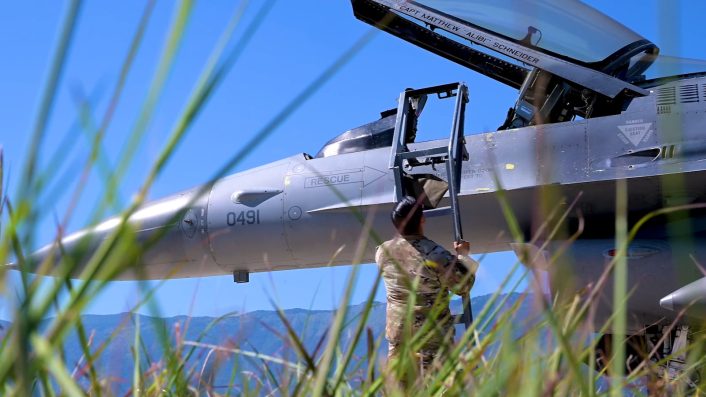
An earlier presentation by Maj. Atkins on Sep. 26, 2023 on DVIDS (Defense Visual Information Distribution Service) showed how the present legacy ladder needs to be “pre-positioned ahead of time” by a single ground personnel.
The “bulky, legacy ladders” cost $5,200 a piece, while the Cockpit Collapsible ACE Ladder comes at “half” the price. It costs $6,800 to move a pallet of the legacy on a C-130 medium transport. This makes the ladder a liability in an ACE environment, with space, logistical and infrastructural paucity.
With the older ladder, while Atkins could easily get into the cockpit, he had to step out by walking onto the wing extensions and then the wing. While otherwise common, the movements are nevertheless delicate and in extremely high-stress scenarios with high tempo of operations and turnaround rates while avoiding enemy surveillance and standoff anti-base strikes, mistakes and imbalance while deboarding the jet are likely.
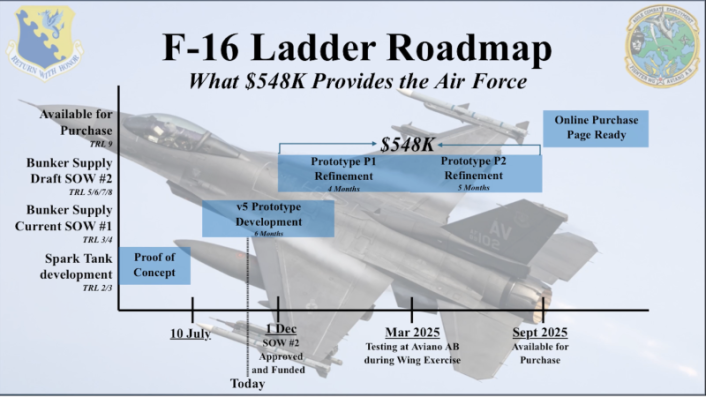
Russia or China might both deploy dedicated reconnaissance and standoff fires units for anti-ACE base strikes, trying locate and hit airfields where Allied fighters keep diverting to. The current ladder, who’s angled half rests on the leading wing roots, would also need removing once the pilot enters the cockpit. They also may not be available at an alternate airfield a pilot might be diverted to during operations, as commanders would be keeping assets distributed and not leaving an identifiable pattern of aircraft movements.
Cost savings
Private sector involvement for the new collapsible ACE ladder puts the price at $86,000 for the prototype and $26,000 for the ladder. But the prototype ladder developed by the 31 FW along with the 9th Training Support Squadron at Luke AFB (Air Force Base) in 2023 costs $300 for parts and $1,500 in labor, making it 65% cheaper than the legacy ladder.
“With ACE operations at the forefront of modern power projection, this ladder is crucial to the evolution of the F-16V Viper,” the narration in the video for the Spark Tank pitch said. Atkins went on to seek “subject matter experts” to help the team cut through the “red tape.”
Atkins has already arranged an indefinite delivery/indefinite quantity contract with manufacturing firm Bunker Supply, to design a new version of the ladder with input from the Air Force’s F-16 System Program Office. What the F-16 Ladder Roadmap needs is $548,000 funding for interim prototype testing and refinement (for a scalable design), that will be “online purchase page ready for acquisition across the Air Force.”
The simple logistical solution enables “resilient basing requirements” and ensures “enhanced readiness” for the F-16s, said Maj. Atkins in his pitch on DVIDS on Feb. 10, 2024 as one of the finalists on Spark Tank 2024.
The ladder would be useful for over 936 U.S. Air Force F-16s, and for F-16s operated by Allied partner nations. The unit anticipates 18 ladders per squadron, starting with 36 ladders for the 31 FW, expanding to the US Air Forces in Europe – Air Forces in Africa (USAFE) 52 FW’s F-16s, following with the five squadrons of F-16s under PACAF (Pacific Air Forces).
Ladder developed for F-22 too
The JBER (Joint Base Elmendorf-Richardson) in Alaska in October 2021, too publicized having developed a “telescopic” ladder for the F-22 Raptor in support of ACE missions. Saying how the “lack of an integrated ladder on board the F-22 Raptor has been a limiting factor for the ACE mission,” the ‘Onboard Stow Ladder’ addressed this problem. The crew demonstrated the current and the newly developed ladder on a life-size mock-up of the F-22’s front section. The present options include the official boarding ladder, which relies on an advanced maintenance package to support.
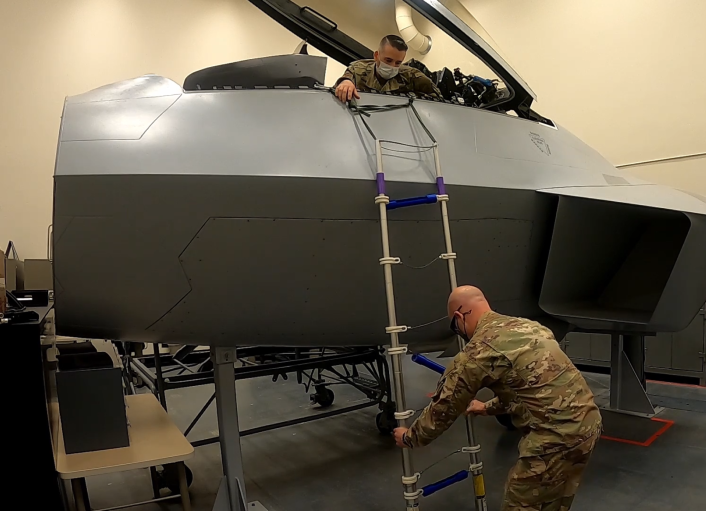
The second is the Alpine Ladder, that can be carried in the pilots’ pocket, which only enables exit from the aircraft, with re-entry remaining challenging. The last one was the Collapsible Ladder, an off-the-shelf solution that stores easily in support packages. But it cannot travel inside the aircraft.
The problem was first identified during deployed exercises where cargo movements left pilots without a method to disembark the aircraft. The collapsible telescopic ladder however has its top ends made of belts and the rest being cylindrical rods fitting one inside the other. The video released by JBER showed Tech. Sgt. Justin Crawford displaying the ladder’s operation, which is also stowable inside the Raptor’s onboard case.

